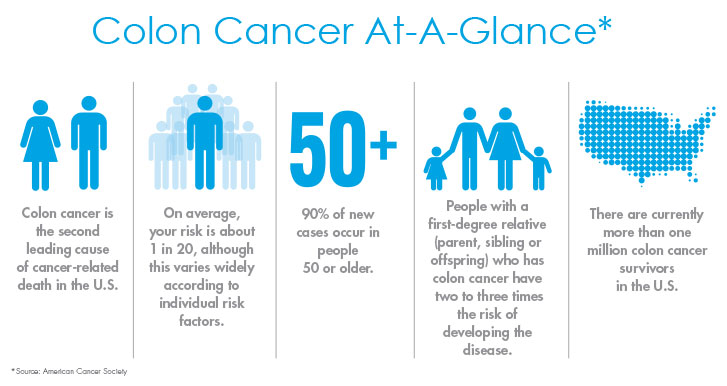Colon cancer is the second leading cause of cancer-related death in the U.S. While there is currently no guaranteed method of prevention, here are five simple steps you can take to mitigate your risk of developing colon cancer.

It’s recommended that everyone should start receiving colon cancer screenings at age 50. However, healthy choices that reduce your risk of developing colon cancer can begin well before that–and continue long after. Here are five simple steps you can take to reduce your risk of colon cancer.
1. EAT FRUITS AND VEGETABLES, AND GET YOUR WHOLE GRAINS, TOO.
One easy rule of thumb is to make half your plate consist of fruits and veggies. Some recent studies with mice have shown blackberries in particular to reduce the risk of colorectal cancer. Whole grains, nuts, and chia seeds are also beneficial because they are high in protein, fiber, and minerals.
2. LIMIT YOUR ALCOHOL INTAKE.
A glass of wine or two at dinner is OK, but don’t overdo it. Abusing alcohol is very hazardous to your health, as it triggers inflammation and dehydration (not to mention impaired balance). The overuse of alcohol is directly related to colon cancers as well as other cancers and maladies.
3. GET AT LEAST 30 MINUTES OF EXERCISE A DAY.
Whether you like to pump iron at the gym or go for leisurely walks in your neighborhood, you need to get that heart rate up each day. Our bodies need physical exercise to replenish cells and tissues.
4. DON’T SMOKE.
If you need help quitting, visit SmokeFree.gov.
5. KEEP A HEALTHY WEIGHT.
Follow the rules above, and this shouldn’t be too difficult. Changing your diet from processed foods to natural foods can be very difficult at first, but once your body gets back into a rhythm of craving what’s good for it, you’ll never want to go back. Trust us.
You might have noticed that each of these are fairly common-sense practices for a healthier life. And it’s true: Following these guidelines will also reduce your risk of heart disease and a number of other health risks. There is no secret trick or magic pill that can protect you from colon cancer or other ailments, but making a conscious effort to make healthy choices will lead to healthy habits that can have dramatically positive effects on your long-term health.
And finally…
GET SCREENED!
The National Cancer Institute offers these key points about colon cancer screenings:
The U.S. Preventive Services Task Force recommends that people at average risk for colorectal cancer start regular screening at age 50 and continue until age 75 as long as their results are negative.
People at higher risk of developing colorectal cancer may need to start screening at a younger age and may need to be screened more frequently than those at average risk.
Guideline-recommended colorectal cancer screening tests check for blood in stool (high-sensitivity fecal occult blood tests) or use an instrument to look at the lining of the colon and rectum (sigmoidoscopy and colonoscopy).
New methods of screening for colorectal cancer include virtual colonoscopy and tests that analyze human DNA in stool or blood samples.
If you’re 50 or over and are due for your colon cancer screening, schedule an appointment with you doctor today!
